The Friendly Fire Room Presents
Listen And See
Thank you Wanda Barlow for this great idea!
Pronouns Metaphors Errors Part 24
Pronouns Metaphors Errors Pt 24
To God be the Glory, great things He has done.
mcmtffr.org wishes to acknowledge and thank Derek Konofalski and Rocket Media for making this page:
Mobile Friendly
Pronouns, Metaphors, and Errors
Message
April 26, 2015
Part 24
We have seen from Mathew 26.26, that the statement from Jesus, “This( bread) is My body”, is a metaphor by five (5) factual counts of itemized proofs.
We also know that the Church of Rome teaches a false doctrine of transubstantiation, which is not only a perversion of language, but a perversion of Truth.
Tens of thousands have suffered martyrdom at the hands of Rome rather than believe the blasphemous fable forced into these words.The exquisite tortures of the Inquisition were invented to coerce the consciences of men and compel them to accept this lie!
Today, I want to help you discover two more proof items which will add two more facts to our argument, that the doctrines of consubstantiation and transubstantiation are but fabricated lies.
5 ![]() 7
7
If we look at the Scriptures carefully,
we will find a pair of metaphors;
one refers to “bread” and the other to “the cup,”
but a literal interpretation has never been claimed
that “the cup is changed into “blood.”
While, in fact, the word “cup’ is used as a
double-name-change( metonymy) for the word “blood”; if one takes the interpretation that the “bread” literally becomes “the body” of Christ,
then one is forced to take the word “cup” to
literally becomes “the blood” of Christ. Hopefully, no one has made such a ridiculous claim!
So, in the very words that follow the statement, “this is( represents) the body of Me,” we unquestionably find another metaphor: “He took the cup…saying…this is My blood.”
Thus we have a pair of metaphors.

the pronoun “this (neuter sing.)” has undergone a
gender change from masculine to neuter, in order
to match the gender of the second noun, “the body,”
yet the gender of the pronoun should ordinarily
match the masculine gender of its antecedent,
“the loaf of bread (masc. sing.),” thus marking this
statement as a true metaphor, Still, ignoring this fact, it is claimed that “is”
means that the loaf of bread is physicallychanged into becoming “the literal body” of
Christ! In the second one,
the pronoun “this” refers to “the cup,” but it is
not claimed that “the cup” is changed to become“the blood” of Christ.
So, the fact that the same exact grammatical structure in these two verses are treated differently is another proof that the interpretation of the first form is wrong.
Furthermore, in 1 Cor 11.25 we read “This cup is the new covenant.”On the other hand, since this too, is the exact same
grammatical form as the other two statements, the
Church of Rome should also be able to tell us how
this “cup” [even allowing for its contents as“the wine”] is transubstantiated into a covenant. Even if you question the validity of the last proof,
you cannot deny the validity of this one.
metaphor (6)
It should be abundantly clear by now that the
figure in the words, “This is the body of Me,” is forced by Rome into a literal statement with the
deliberate purpose and design of making it teach
and support an erroneous doctrine that suits her
purposes!
Here are other examples of the metaphor figure in this immediate connection.
NKJ 1 Corinthians 10:16a
“The cup of blessing which we bless,
is it not the communion of the blood of Christ?”

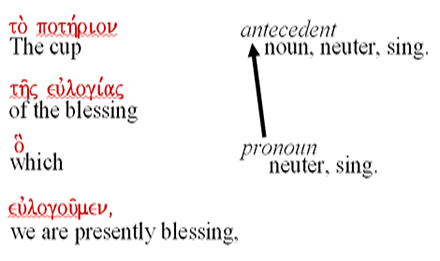
This phrase is descriptive of “the cup,” the 1st noun of the predicate nominative pair…
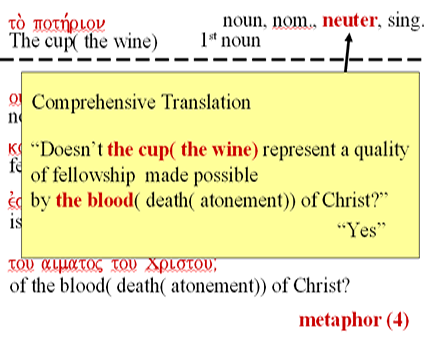

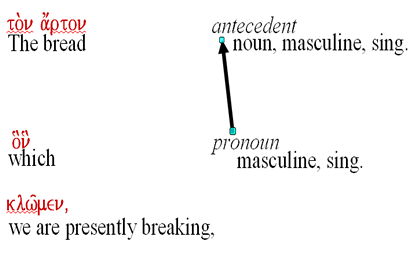
This phrase is descriptive of “the bread,” the 1st noun of the predicate nominative pair…
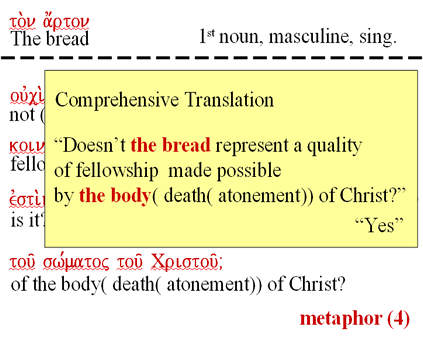
Let’s change gears in the same vehicle.
Having mentioned that the verb of a metaphor is always a substantive “to be” type, I want to look in another direction.
Having mentioned that the “to be” verb of a
metaphor always means “represents,” I want to
look more careful at the claim of the Church of
Rome with regard to their idea that “the bread” becomes “the body of Christ” in a literal, physical
sense of reality.
Note: Does the phrase “at the tinkling sound,” as a cue marking the moment at which the actual change in substance is said to take place, ring a familiar tone?
The implication of this notion is tremendous, and at least gives us something to think about.If you can predict and know the exact moment when a miraculous event will occur, you are effectively in control of the process, to some extent.Compare his notion with the earlier claim associated with the sale of indulgences, then with the words of Jesus with regard to the work of the Holy Spirit when one is “born again.”
The verb ![]() “I am,” or the infinitive of it, “to be,” means to be in the sense of signifying or amounting to.
“I am,” or the infinitive of it, “to be,” means to be in the sense of signifying or amounting to.
This is why, the “to be” verb always means “represents” in the context of a metaphor, and so the notion of “representation” always plays a necessary part in qualifying the distinctive form of the metaphor as a figure of speech.
The primary sense of “to be” verbs; namely, “signifying,” “amounting to,” and “representing” is in its essence( abstraction) the notion “to mean,” but never the notion “to change.” Bear with me( wait for it) since I have not yet indicated to you where I am heading with this.
This is why in the following non-metaphor passages, the “to be” verbs are actually translated “to mean,” instead of “is.”
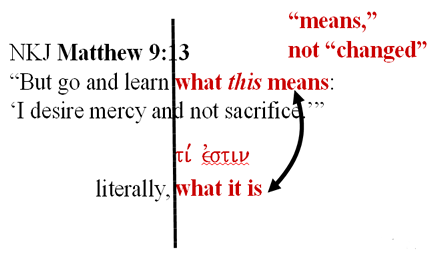
Another…
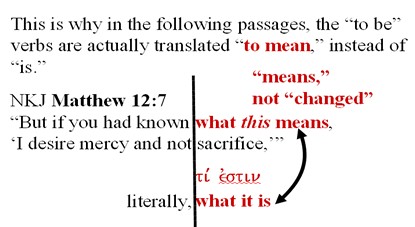
Another…
This is why in the following passages, the “to be” verbs are actually translated “to mean,” instead of “is.”

On the other hand, if an actual change is meant, then the language must use a verb which plainly and actually says so; because the verb “to be”never has or conveys any idea such as a change!
The usual way to express such a change is to use
the word ![]() , which means “to be,”“to become.”
, which means “to be,”“to become.”
Its good for us to develop little conventions to assist us in our study of Scripture. We can use = for the “to be” verb idea, and => to mean “to become.”
Examples…
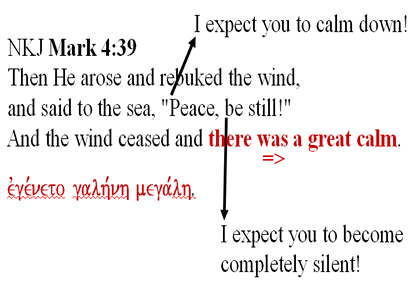
![]() aorist, middle-voice
aorist, middle-voice
it became on it’s own behalf
=>
![]()
![]()
a great calm (of the sea).
The winds and the waters were changed from one state into another state as they
responded to the words spoken by Jesus.
=>
This event has many overtones; one implication is
that the change of state was a real physical
transubstantiation, which => =>
can also be described
in psychological terms, as a change from insanity
to sanity.
NKJ Luke 4:3
And the devil said to Him, “If You are the Son of God, command this stone to become bread."
=>
![]()
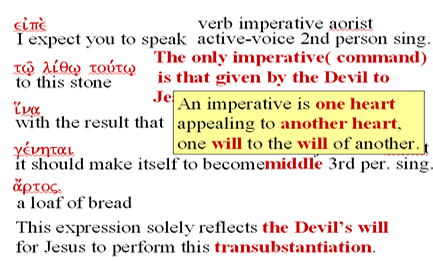
Note: A better translation would have been: “Since You are the Son of God, I expect You to speak to this stone so that (of result) it should make itself to become (middle-voice) a loaf of bread. =>
a real transubstantiation
Implication:
The Devil, having no authority relationship over the Christ, has to attempt to command by forcefully stating an expectation of his own will toward someone with whom there is no relationship of trust or love; his appeal is limited to the flesh-nature of Christ.
Implication:
On the other hand, Jesus has only to speak forth the expectation of His will toward creation( that which belongs to Him) and it obeys His word without hesitation, such as would an obedient person who is in a trust, love, and authority relationship with Him.
Implication:
If Jesus had let personal pride convince Him to demonstrate to the Devil that He was in fact able to speak to the stone and it would change itself into a loaf of bread, then He would have at the same time been obedient to the will of the Devil, and the implication would have been that Jesus placed the will of the Devil higher than the will of the Father.
At the institution of the Communion Supper
Jesus did not speak to the bread or to the wine
so that they should make themselves “to become”
His body and His blood
=>
; nor did He specifically
empower the disciples or instruct them as to how
to speak to the elements in His name, with the
expected result that they( the elements) might
effect such a change to themselves.
metaphor (7)
But the Church of Rome, has no problem with
taking authority that has not been delegated to her. At the speaking of these words from the priest, “This is My body,” the bread is said to become the actual physical body of Christ!
=>
So, this is an expectation that even Jesus did not have of the same elements.
Implication:
The Church of Rome believes she has absolute authority over these elements of creation, much the same as if she owned them, so that at the word of her priest they must obey, with the result that they might make themselves to become His body and His blood! =>
Many will be surprised on the Day of Judgment
when they discover
that it was just as the Word of God says;
only the righteousness of Christ is able to save you.All men are sinners and no one can save himself.
God is just, so He must punish sin;
but He is also merciful, moreover gracious,
and offers His Son as the perfect sacrifice
in order to purchase a place for you in heaven,
which He offers to you as the free gift of eternal life.
Jesus is God Incarnate,
In order to pay the debt of our sins, He came from Heaven, having been sent by the Father,
where He lived a life of perfect obedience to the Father
even unto the shameful death upon the cross
in order to pay the debt of your sins.This gift must be received by faith,
believing that Jesus’ perfect life and Cross Work
was His complete and necessary Atonement
for your sins, in your behalf.
Faith is a gift that comes by the Power of God the Holy Spirit working in a person’s innermost being.
Only the power of God can open your heart to the willingness to have the void within it filled
with the presence of Christ by His Spirit.The Holy Spirit has the authority and power to quicken your dead spirit, to make it come to life.
Only the life of His Spirit’s quickening of your heart will allow the Gospel message of salvation to even make sense to you, to truly “hear” the message and give you the ability,
as the Holy Spirit bears witness to Jesus,
to recognize your need for forgiveness and restoration, and gain the desire of your heart to be favorably inclined to want to receive Christ as your personal Lord and Savior.If you have not done so before this moment,
ask Jesus to forgive you your sins,
tell Him you’ve stop trying to be your own savior,
and ask Him to come into your life right now,
and to give you eternal life. Then, in faith believing,
thank Him for the gift that He is giving you,
the one He paid for in full in your place,
in Jesus’ name,
AMEN
Copyright April, 2015
Rev. Jim Craig
All Rights Reserved
Bibliography
Agnes, Michael and Charlton Laird (eds.). Webster’s New World Dictionary and Thesaurus. New York, NY: Macmillan, 1996.
Aland, Kurt, Matthew Black, Carlo M. Martini, Bruce M. Metzger, and Allen Wikgren (eds.). The Greek New Testament, 4th rev. ed. Germany: Biblica-Druck, 1994.
Benner, Jeff A. The Ancient Hebrew Lexicon of the Bible. College Station, Texas: Virtualbookworm.com Publishing Inc., 2005
Bullinger, E. W. Figures of Speech Used in the Bible; Explained an Illustrated. Grand Rapids, Michigan: Baker Book House, 2007.
Chapman, Benjamin. Greek New Testament Insert. Grand Rapids, Michigan: Baker Book House, 1977.
Dana, H. E., and Julius R. Mantey. A Manual of the New Testament. Canada: The Macmillan Company, 1957.
Louw, Johannes P. and Eugene A. Nida. Greek-English Lexicon of the New Testament Based on Semantic Domains. New York, NY: United Bible Societies, 1989.
The ESV Study Bible. Wheaton, Illinois: Crossway, 2011.
Metzger, Bruce M. Lexical Aids for Students of New Testament Greek. Princeton, New Jersey, 1977.
Wikipedia contributors. "Xenophon." Wikipedia, The Free Encyclopedia. Wikipedia, The Free Encyclopedia, 15 Aug. 2014. Web. 19 Aug. 2014.
Wuest, Kenneth S. The New Testament; An Expanded Translation. Grand Rapids, Michigan, 1992.
Wuest, Kenneth S. (Revised, Donald L. Wise). The Practical Use of the Greek New Testament, rev. ed. Chicago, Il: Moody Press, 1982.
Walsh, J. Martyn and Anna Kathleen Walsh. Plain English Handbook: A Complete Guide to Good English, 7th rev. ed. Cincinnati, Ohio: McCormick-Mathers PublishingCompany,1977.